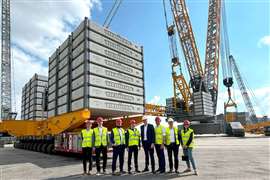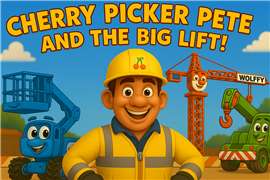Juhren takes reins at Morrow
10 August 2020
Morrow Equipment’s president and COO Peter Juhren knows his company and the tower crane market as well as anyone.
Morrow Equipment started its journey to becoming the largest tower crane company in North America in 1968 when brothers John and Richard Morrow started their business with one crane. In 1978, the company became the sole distributor of Liebherr tower cranes in North America.
Today, Morrow is a global leader in the industry, but one thing has not changed. Morrow still follows its core values of providing the best equipment and service, according to Peter Juhren, who recently took on the role as president and chief operating officer.

Juhren started his career in the tower crane sector in 1980 in New York when he took a $5 an hour job as a shop worker at American Pecco in New York. He interviewed with Peter Jehle, who later co-founded PJ Arcomet, and who is still with that company.
“After a couple of weeks, my mentor, Gerhard Langer, took me under his wing and decided I was going to work in the crane division as a technician,” Juhren remembered. “After a brief training period (and I mean brief), I was out putting up tower cranes.”
In 1981, at the ripe old age of 22, he was offered the job as service manager in the San Francisco office. He worked there until 1984, when he returned across the country to New York, taking over as service manager for the northeastern U.S. In 1990, he was recruited to move to Atlanta and develop the southeastern region for American Pecco. Three years later American Pecco and Morrow Crane merged, and that is when his long and successful history with Morrow began. After being promoted to corporate service manager he moved to Morrow’s headquarters office in Salem, OR. He was named global vice president of operations in 2015, and then he got the call to run the entire operation in June of this year.
Juhren said he did not really set his sights on taking the top role, but continuity has always been important to the company.
“I cannot say that I envisioned being in this position, but Rick Morrow mentored me over years and made sure there would always be continuity in the organization,” he said. “With his passing, my responsibilities increased, and then due to the unfortunate passing of Christian Chalupny, the president, our team members were relying on me for guidance and structure. I believe staying humble and remembering where you came from makes decisions clearer especially when it involves people. I can say that now that I sit here it’s an accomplishment in the fact that the Board of Directors have the faith in me to guide the company going forward.”
Juhren is known as a straight shooter who is well spoken, easy to talk to and knowledgeable. He also genuinely cares about the industry and all things safety. He has long been a supporter of crane operator certification and training. And more training. Never stop training.
I have known him for many years, and I was so happy to see him recognized for the work he has put into making Morrow the best it can be. I think you will be interested in his answers to our questions.
WHAT DO YOU SEE AS THE BIGGEST CHALLENGES IN YOUR NEW ROLE?
Change. The industry has changed, and we are looking at ways we can shape change and adapt to the environment. There is much more competition now in the tower crane industry, and we must find ways to stay ahead of the curve and make decisions accordingly, especially in smaller regions. We will look to expand markets, increase our exposure, and drive forward to increase market share and be creative.
YOU HAVE ALWAYS SEEMED TO LOVE YOUR JOB AND THIS INDUSTRY. WHAT IS IT ABOUT MORROW AND THIS INDUSTRY THAT HAS KEPT YOU ENGAGED?
No one ever woke up and said, ‘I want to be in the crane industry.’ I fell in love with this business after I put up my first tower crane solo. It was empowering. Driving away and looking back at this giant machine doing a balancing act had me hooked. After nearly 40 years, I still get that feeling when I drive around and see one.
Morrow has been a world class company to work for, and the people have been the main reason, from all the team members to the executive level, everyone has the same respect. No one in this company is more important than anyone else, we just have different levels of responsibility. In addition, the organizations I have served on and been a part of to make this industry better have been rewarding, and hopefully when I leave this industry, I can say I contributed to making it better.
MORROW HAS THE LARGEST FLEET OF TOWER CRANES IN NORTH AMERICA. HOW DO YOU CHARACTERIZE THE TOWER CRANE MARKET DURING THIS TUMULTUOUS TIME?
The market has seen weakness over the past several months, but I do not see this as a crash like we saw in 2009-2010. There are quite a few strong areas in the country, but overall, there has been a softening. We have seen downward pressure on rates in some markets, but all in all I feel there will be room to grow in the fourth quarter of 2020.
Fortunately, the shutdowns due to the Covid-19 virus have had a minimal impact on the construction industry overall, and we have been fortunate in that respect. I believe that the current slowdown is more for projects delayed than cancelled, and we should see this improve once there is a clear path to reopening on a grand scale. As the States had different definitions of “essential,” the impact was different based on those definitions.
WHICH METRO AREAS APPEAR TO BE DOING WELL? WHICH AREAS ARE ON THE DECLINE?
The West Coast is still a strong market, such as Seattle and Los Angeles, as is the Southeast and Florida. The Northeast has seen some improvement, but the Midwest is still softening.
MORROW HAS LONG BEEN KNOWN FOR ITS SAFETY TRAINING CULTURE. HOW DID THE COMPANY ROLL OUT ITS COVID-19 SAFETY PROTOCOLS?
We first identified all employees that could work remotely and set them up so as not to be exposed or expose others. Second, we implemented a social distancing program, sanitizer and face coverings for all employees. We have our office cleaning staff sanitize every touchable surface every day. For those essential team members, we have set out detailed instructions on training for working safe, including mandatory temperature checks for all people entering any of our offices or facilities, restricting entrance points and sanitizing regularly. We have invested heavily in information signs and PPE.
WHAT IS YOUR TAKE ON THE SELF-ERECTING TOWER CRANE MARKET IN THE U.S.?
I feel this is a market that will see continued growth and acceptance. While a different business model than tower cranes, educating users of other methods for low rise buildings is the key to growth. We are looking for ways to grow this segment of our business and have developed a strategy that will enable us to see an upward trend in market share.
WHAT ARE THE BIGGEST ISSUES FOR THE TOWER CRANE SECTOR RIGHT NOW?
One of the biggest issues is insurance, and the cost and availability, and not just for tower cranes. Rates have doubled and tripled over the past three years, and many companies have exited the underwriting of cranes. Regulatory compliance is also challenging in the fact that many different states and even cities have their own set of regulations. Some jurisdictions allow the authorities to decide what is acceptable and this can be a challenge when getting approval. While we have a generally young fleet, maintaining a fleet (young and old) is paramount to safety. We have an exceptionally detailed QA/QC and maintenance program to ensure what we deliver is the best in the industry.
DO YOU SEE MORE OF AN ACCEPTANCE FOR HOOK CAMERAS AND RELATED TECHNOLOGIES ON TOWER CRANES NOW THAN IN THE PAST?
Anti-collision systems seem to be advancing in the acceptance area. More multi-crane jobs are requiring them to ensure cranes do not come into contact with each other. As for cameras, the jury is still out. In Hawaii they have been universally accepted and are on almost every tower crane. Yet in other parts of the country there are none. I think this segment is growing but not as rapidly as say Great Britain or Australia.
WHAT IS YOUR BUSINESS PHILOSOPHY?
Empower people. I have always surrounded myself with the best and smartest people I can find, then let them do their job. Of course, I plan, strategize and am the vision forward, but I am not the smartest one in the room. I may make the decisions, but they are based on information from people I trust. Respect is a two-way street. I have never demanded it, and I have tried to remain humble and never forget where I came from, and how I got here now. To maintain our leadership position, we will have to think outside the box, look inward, grow in new areas. I plan on expanding our team to reach these goals going forward. The future will be exciting, and I am looking forward to many more years.
WHAT DO YOU LIKE TO DO WHEN YOU ARE NOT WORKING?
I am not sure I am never not working, but I love spending time in our RV seeing the country, and spending time with my three grandchildren.
STAY CONNECTED


Receive the information you need when you need it through our world-leading magazines, newsletters and daily briefings.
CONNECT WITH THE TEAM











